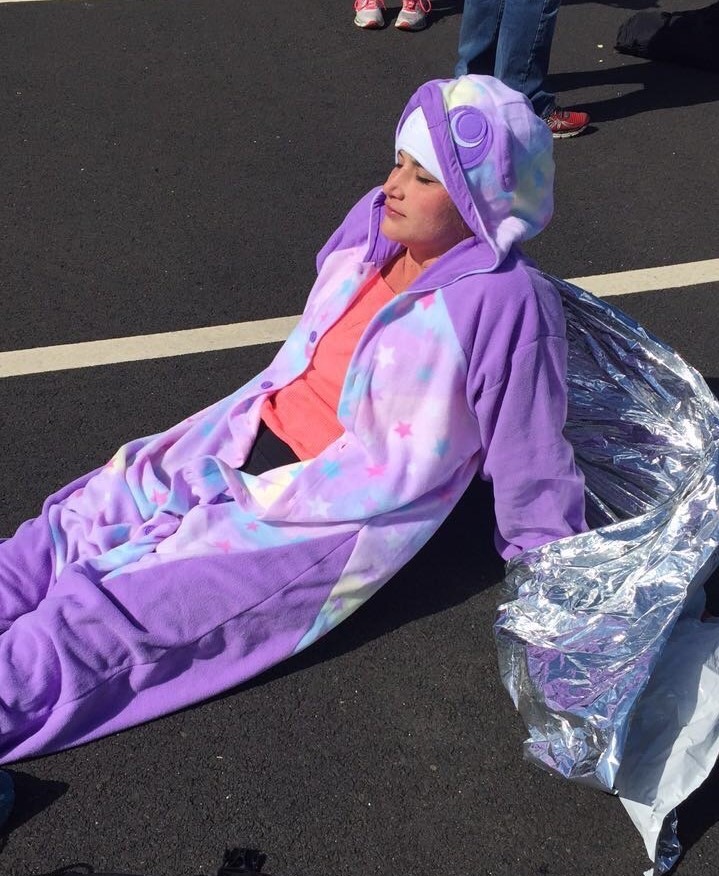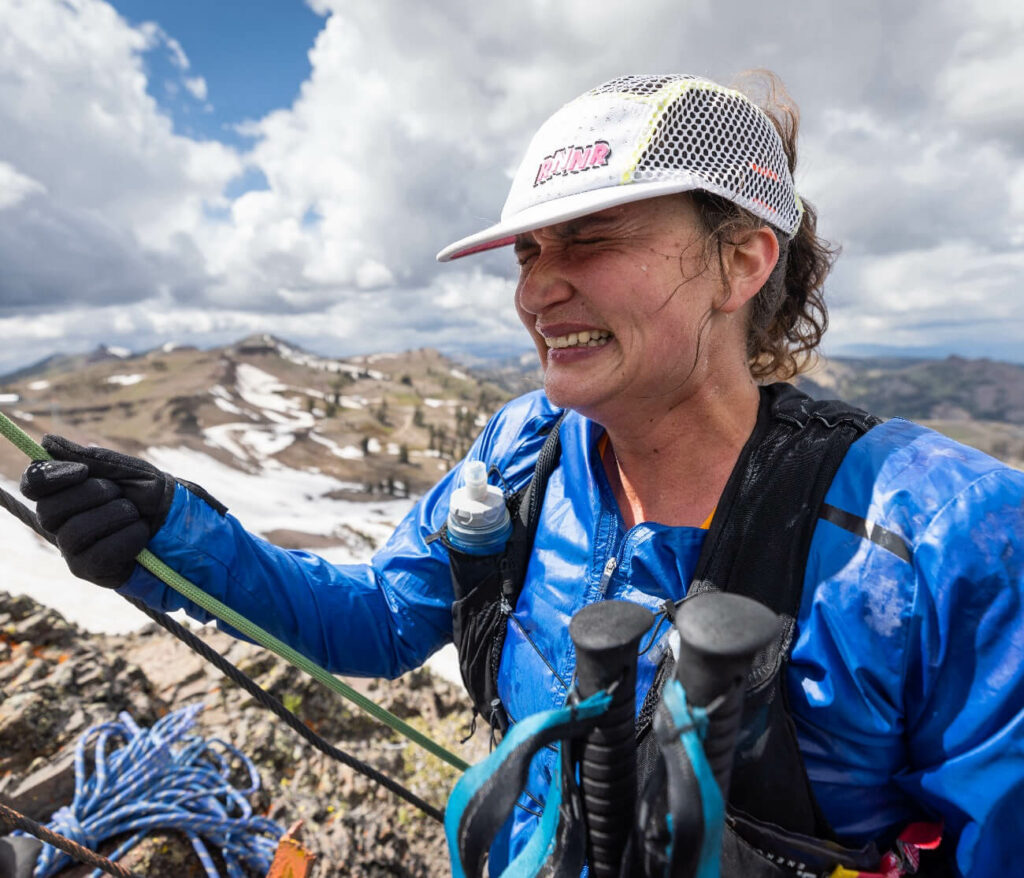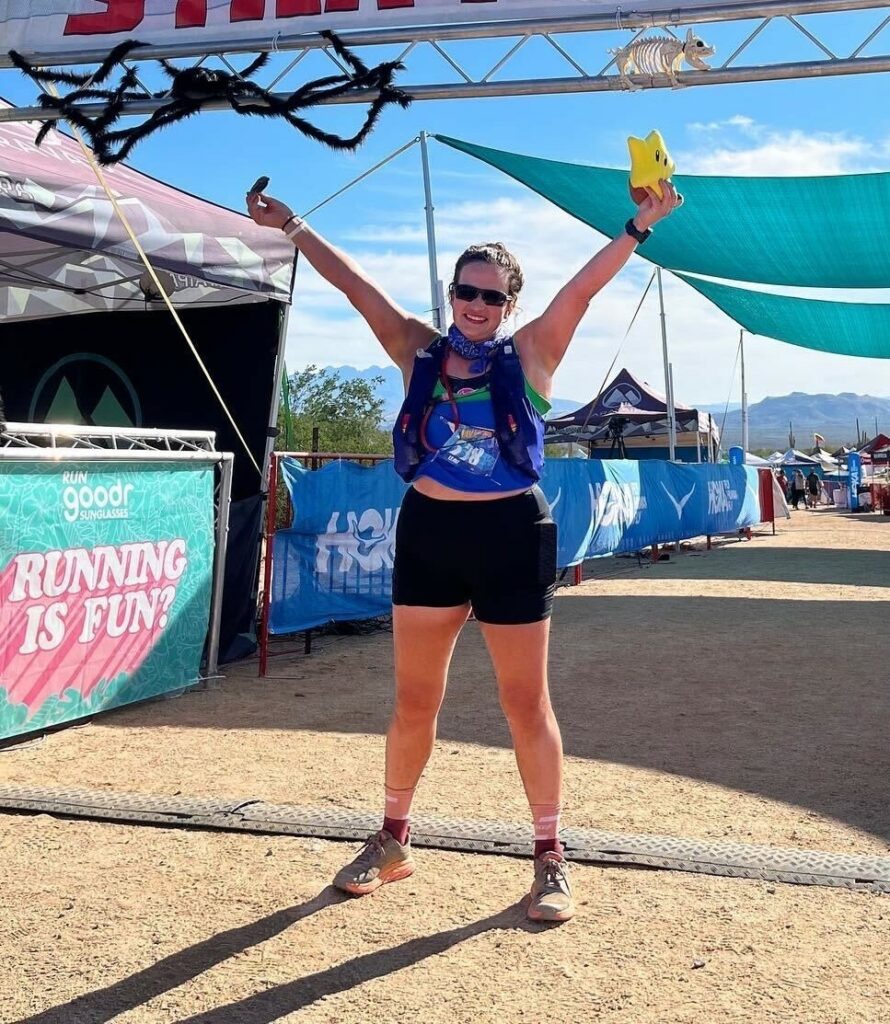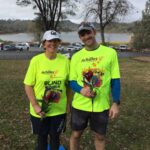Leah Snider, a graphic digital product designer living in Golden, Colorado, started running in high school, not because she had a hankering for the sport, but because she had a crush on a boy on the team. (Tale as old as time.) While the crush faded, her interest in running didn’t. During her high school years, she ran cross country and track, settling on the longer distance events. Looking to continue running in college, Leah took charge of her destiny and reached out to the coach at Clairmont Mudd-Scripts College in Clairemont, California, and ran there for four years. Though she had a deep desire to perform at a high level, her legs didn’t always follow. And, like many college runners, she was plagued by injury and an abundance of race anxiety. Admittedly, Leah recognized the pressure she felt when it came to racing was internal. While the physical aspect of her performance fell short of expectation, her college experience taught her to value her most defining personality trait – an abundance of emotion and heart.
After graduating from college, Leah returned home to Washington, DC. While searching for a job, she coached middle school and high school cross country. Then, as she settled into full time employment coaching fell away – but running never did. Adopting a “more must be better” mentality, she jumped into the Washington, DC Rock and Roll Marathon. Buoyed by the runners she coached, who stationed themselves along the course, she had a great race experience, thrilled with her time, four hours five minutes, and the fact that she covered the distance.

However, as time passed, nagging doubts crept in, and Leah thought her performance wasn’t good enough, that she could have gone faster, could have trained harder, could have done more. Still trapped in the more is better mentality she pushed harder, resulting in an Achilles tendon injury that kept her from running for eight months. It was during this time that Leah recalibrated her philosophy, that more didn’t equate to better. She realized pounding herself on the roads forever wasn’t sustainable, and came to appreciate strength training. Ever since, she’s remained injury free in her running.
At this point in her running journey, Leah entered what she described as her “why not” phase and jumped into obstacle course racing. During this period she fell in love with the mountains, the trails and wanted to be outside more than she wanted to be in the gym. In March 2020, she was supposed to race the Spartan Ultra in San Luis Obispo, California, but because of the onset of the COVID-19 pandemic, the race was cancelled. While waiting out the pandemic, Leah ran the trails around Washington, DC, including many miles in the Rock Creek Park during the week, and in Shenandoah National Park or the George Washington National Forest on the weekends. It was also during this time that Leah started doing heart rate training with a coach finally learning not to run too hard. She came to value the long, slow efforts and began to get a sense of the varying degrees of perceived effort, something she had no sense of before doing this type of training.
When races opened up in 2021, Leah registered for the Grayson Highlands 50-miler. Having focused intensely with her coach on the physical aspects of training, she was disappointed when she recorded her first DNF (did not finish), dropping at mile fourty. In retrospect, Leah felt her fitness was close to what she needed, but mentally, she had a lot more to learn. This included having the mental stamina to be on her feet for such an extended period of time, and honing more robust troubleshooting skills as the miles pile up. While processing her race experience, Leah randomly read a post by Nick Ademus de la Rosa (née Hollon).
Are you dealing with a DNF – come
be part of my call.
Leah knew Nick was a well-known runner, one of the few to finish the Barkley Marathons. Just like she was compelled to pick up the phone when she was looking for a college to run at, she called Nick. It turned out she was the only runner to respond to his invitation, and the two talked for an hour about how a DNF didn’t have to define an individual’s selfworth. And while she was happy to train with her current coach, she continued her conversations with Nick about the runner’s mindset.
At her next race, the JFK 50-mile, Leah not only finished her first race of that distance but far exceeded her expectations. While her goal was to run 11 hours and 30 minutes, she finished in 10 hours and 47 minutes. She also attained what she described as a flow state during the race, feeling in complete control of her body. Her performance at JFK was a turning point. Because of her talks with Nick, she wanted to pay as much attention to her mental game as she did the physical training. She wanted to run from the middle ground of emotions, rather than from a place of cycling through extreme highs and lows. She came away a hungry, happy runner.
At the beginning of 2022, Leah was ready to work towards her next goal, to run the 100-mile distance. Even though her coach had never trained athletes for that distance, Leah had no reservations about sticking with him. While her coach was willing to put a plan together and continue to work with her, he urged her to consider working with someone more experienced with the ultra distance – so she picked up the phone and called Nick again.
As far as the coach-athlete relationship was concerned, the switch to Nick was seamless, but it came with a change in training style that wasn’t as smooth. It didn’t help that the change coincided with her move to Golden, which meant she now trained at elevation, and often in the snow. All these factors made Leah feel like she completely lost her internal compass. Unsure running in the big mountains was for her, she had to dig deep to trust the process and give herself time to adapt. She slowly came to understand no matter how bad she felt, she was building her base – it just looked different than before. In the end, Leah ran longer distances, spent more time on her feet, and supplemented her running with strength work and indoor rock climbing.
With the higher volume training the importance of rest days increased. And while she took care of her body, it was much harder for her to quiet her mind. Old thoughts crept back into her psyche, especially the ones tied to having unrealistic expectations. Trying to combat the old “more is better” mindset, Leah worked with Nick for several months to identify why there was an incessant voice that told her whatever she was doing was not enough. Finally, she was able to accept and reframe the negative narrative in her head.
That spring, stoked to utilize her new physical and mental skills, the plan was for Leah to enter a series of races meant to prepare her for the 100 mile distance. The first challenge was the Desert Rats 50-kilometer race and, as luck would have it, it was the first hot day of the season. She didn’t adequately hydrate and, though she finished, her performance suffered. In the past, such an outcome would have derailed her for weeks. Now, she mulled over the outcome for a couple days, then quickly moved on. Instead of thinking about the heat as a personal failure, she accepted she just needed to improve hydrating in warm conditions. A turning point, Leah no longer framed the setback as something that was the result of a flawed personality trait.
Looking to get back on track, Nick suggested Leah jump into a local 25-kilometer race. At first, she insisted she wasn’t prepared to perform at her best. But, because of Nick’s persuasive ways, she ran the race with the mindset that it was nothing more than a normal training run. She allowed the need to “measure up” to others go, and clocked a time of three hours and two minutes. It was the first time Leah focused on herself and what her body could do throughout the race. Her mindset was reframing.

In June, she ran the 52-kilometer race at Broken Arrow. In theory, the race was supposed to be a steppingstone to the Ouray 50-miler, and she went into the race on tired training legs. But she also stood at the start line with a confidence she’d never had before. Surrounded by the who’s who of running, Leah pinched herself knowing she was standing shoulder to shoulder with some of the best in the sport. Of course, she still had to troubleshoot setbacks during the race. On the second loop, she had a panic attack, and the same heights she had handled flawlessly during her training runs suddenly terrified her on the high ridgeline. As she crested the climb on that second loop, she cried as the bad thoughts cleared, and an intense sense of relief overwhelmed her. She quickly regrouped, finished the race, and came away knowing the low points were no longer deal breakers. Her mindset was reframing.
While the race went well Leah found it difficult to recover from the effort. It turned out she had low ferritin, a marker of iron deficiency, and she decided not to run the Ouray 50-miler giving herself the time to treat the problem. Though disappointed, she adapted, adjusted, and moved on. Once she felt better, she got out on new trails around Colorado and jumped into a couple of smaller races. Happy with her running, and her mental strength, she was in a groove.
Leading into the Javelina Jundred, Leah averaged her biggest weeks ever. She attributed this to the mindset work she did with Nick, by staying super present to what she wanted and needed during those big training days. Asking herself those two simple questions, “What do I want?” and “What do I need?” became her mantra.
Feeling prepared, Leah’ was excited to see what she could do over the course of a 24-hour cycle. The idea of starting at dawn, working through daylight, dusk, nighttime, and finishing after what she hoped was a glorious second sunrise, was enticing. And since there was only one cutoff to meet, to start the fifth loop by the 24-hour mark, she was confident she’d make it. Ultimately, she beat the cutoff time with almost three hours to spare.
With a crew of two friends from college, two from Colorado, and Nick, who joined after pacing one of his running clients, Leah had what she described as the best 26 hours 59 minutes of her life. All the work she’d done during the year paid off. Once the race started, she got a feel for the course, her home for the next day. And she studied the terrain, in preparation for night running. On the second lap, during the peak heat of the day, she had to back off on a big climb. At the beginning of each lap, she knew what needed to be done. “What do I need?” Instinctively, she wanted to question herself, but quickly turned her thoughts towards giving herself grace, reminding herself when night came, she’d rebound. “What do I want?”

On the third lap, Leah picked up the first of her three pacers, and the two laughed as they ran. On the fourth lap, Leah picked up her second pacer, someone she hadn’t seen in months and was thrilled to spend time with. By the time she picked up her last pacer, the objective was to soak in the remaining experience. Unburden by any time constraints, she was content with forward movement. Leah found the sunrise empowering, knowing she ran through the night and just needed to bring it home. Her crew donned costumes and joined her for the final quarter mile. It was a real celebration of where she came from, and where she was going.
